Summer School 2025 - more information

Chairs
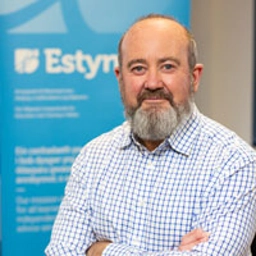
Owen Evans
His Majesty’s Chief Inspector of Education and Training in Wales
Owen Evans is responsible for the inspection of education and training in Wales, as well as the management, staffing and organisation of Estyn. He provides independent advice to Welsh Ministers which contributes to the development and review of policy in Wales. Owen also plays a key role in working closely with the other inspection, audit and regulation bodies in Wales, to underpin joint planning and working. In addition, as Estyn’s Accounting Officer he ensures that resources are used properly and provide value for money. The Chief Inspector also publishes an Annual Report on the standards and quality of education and training in Wales.
Welsh speaking, Owen was educated at Ysgol Penweddig and Coleg Ceredigion, Aberystwyth before graduating in economics from Swansea University. Owen joined Estyn from his position of Chief Executive of S4C, the Welsh language Broadcaster. Prior to joining S4C, he was Deputy Permanent Secretary of the Welsh Government, responsible for Education and Public Services. Between 2008 and 2010 he was director of Business in the Community Wales and for 10 years before that he worked for BT, including as a member of the UK team developing BT's broadband strategy. He has served as a member of the Welsh Language Board and previously chaired the Cardiff Education Development Board.
He is currently a member of Marie Curie's advisory board in Wales, is part of the Speakers for Schools programme and chairs WEPCo. He is a member of Aberystwyth University's Council.

Shereen Williams MBE OStJ DL
Chief Executive Officer of the Democracy and Boundary Commission Cymru and Secretary to the Boundary Commission for Wales
Shereen Williams MBE OStJ DL is the Chief Executive Officer of the Democracy and Boundary Commission Cymru (DBCC) and Secretary to the Boundary Commission for Wales (BCW). She has led on significant boundary reviews, including the 2023 Parliamentary Constituencies Review and the first-ever review of Senedd constituencies for the 2026 elections.
Prior to taking up her role in DBCC, she spent 10 years in local government working across East Gwent as the Connected Communities Manager and prior to that as the Regional Community Cohesion Co-ordinator. She has also volunteered extensively in the Third Sector and statutory bodies, receiving numerous awards for her community service.
In 2023, she chaired the Democratic Health Task and Finish Group, addressing challenges faced by Community and Town Councils.
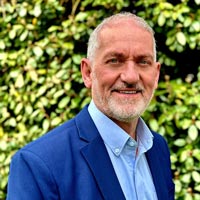
Dr Neil Wooding CBE
Chair, Hywel Dda University Health Board
Neil has spent his career as a public servant working in central, regional and local government as well as the NHS and voluntary sector. Prior to his current role, as Chair of Hywel Dda University Health Board, he worked in the Cabinet Office with executive responsibility for workforce reform and professional standards. This followed his appointment as Chief People officer to the Ministry of Justice, responsible for prison, probation and court services across England and Wales.
More locally, he is the Chair of the Wales Council for Voluntary Action having worked in a voluntary capacity since the age of 17. During his career, Neil served as the Commissioner for Equality and Human Rights for Wales leading a number of public inquiries into Migrant labour and Human Rights, and was a Trustee of Stonewall UK and the Lloyds Bank Foundation Trust.
Over the course of his career, Neil has published a number of papers on leadership and management development spending time at the JFK School of Government, developing new approaches to public service leadership.
Internationally recognised for his expertise, he has worked in Scandinavia, the United States, Canada, India and sub-Saharan Africa.
He is a Companion of the Chartered Institute for Personnel development and was awarded a CBE in 2022 for his outstanding contribution in the fields of Equality and Social Justice.
Speakers
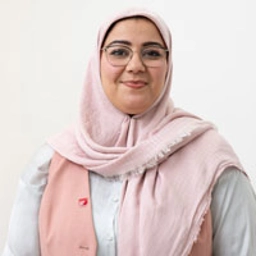
Dr Mabrouka Abuhmida
Research & Innovation Group Leader, University of South Wales
Dr Mabrouka Abuhmida, a Senior Lecturer in Computing and the guiding force behind the MSc Artificial Intelligence course, is celebrated as the STEM Woman of the Year 2023. Her extensive expertise in artificial intelligence and machine learning has been the cornerstone of interdisciplinary research.
Her work, notably in cyber security, showcases her innovative approach to applying AI to diverse sectors. Her leadership extends beyond academia; Her advocacy for seamless technology transfer is evident in her efforts to bridge gaps between public institutions and private enterprises, fostering partnerships that drive technological advancement and innovation.
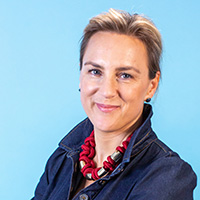
Hayley Barnard
Mix Diversity
From trekking across the Arctic and swimming the English Channel, to running three successful companies, Hayley Barnard knows a thing or two about maintaining motivation. Having worked with FTSE100 and Fortune500 companies across the globe, she brings this experience, as well as a deep understanding of workplace culture and challenges, to every presentation - equipping leaders with the necessary tools to foster healthy and resilient workforces & communities.
For the ‘day job’, Hayley is CEO of Mix Diversity, an Inclusion consulting & training firm. She is also a trustee for Ufi VocTech Trust, an organisation which seeks to unlock the potential of technology to improve skills for work.

Ian Govier
Senior Leadership Development Manager, Academi Wales
If you were to ask Ian about his approach to life, his likely response would be to “enjoy and live each day with purpose, faith and passion, to be teachable and always keep learning”.
Ian is a Senior Leadership Development Manager at Academi Wales, Welsh Government and, since 2005, has also run his own leadership development and coaching business with clients from across the United Kingdom and Ireland. As an experienced and effective facilitator and coach, Ian has a successful track record of working with individuals and multi-professional teams to create and build relationships that produce purposeful change; he is widely known for adopting a knowledgeable, creative and values and principles-based approach to personal and professional development.
Ian has held leadership and management positions in a variety of organisational settings, presented many innovative papers on leadership, coaching and mentoring at UK and European Conferences as well as penning several journal publications. His professional background is nursing and education and he has previously served as an officer in the Army Medical Services. Ian also enjoys volunteering as a National Trust Tour Guide at the Aberdulais Falls and Tin Works industrial heritage site.
Ian strives to achieve a healthy life balance through activities that include playing the piano and guitar, singing, acting, bird watching, walking and fly fishing.

Dr Stephanie Hare
Co-presenter of BBC TV 'Artificial Intelligence: Decoded' and author of 'Technology Is Not Neutral: A short guide to technology ethics'. Dr Stephanie Hare is an author, consultant and keynote speaker who focuses on the impact of artificial intelligence on business and society. Her book 'Technology Is Not Neutral: A Short Guide to Technology Ethics' examines the issues surrounding AI and Big Tech as well as its effects on humankind.
Stephanie’s expertise sits neatly at the intersection of business, technology, governance and ethics in the current era of surveillance capitalism. Stephanie was selected for the BBC’s Expert Women initiative and now commentates regularly on the BBC. She is a presenter of the broadcaster’s 'Artificial Intelligence: Decoded' and is a regular contributor to the BBC World Service slot Business Matters.
Stephanie is an engaging Event MC and moderator who mixes academic rigour with warmth and dynamic delivery when she is onstage. Before becoming a global media commentator and communicator, Stephanie worked for Accenture, Palantir and Oxford Analytica. Her work has been published in The Washington Post, The Guardian/Observer, WIRED, Harvard Business Review and The Financial Times, which selected 'Technology Is Not Neutral: A Short Guide to Technology Ethics' as one of its books of summer 2022. Dr Hare’s book is currently included on the syllabus of Harvard Law School.
Stephanie Hare has consulted and presented events for many firms and brands. These include LEGO, KPMG, IKEA, the Royal Society, the Vodafone Institute, BAE Systems, Citywire, CERN, Mishcon de Reya, the Internet of Things Alliance Australia, The Alan Turing Institute, Mayer Brown, 7 Bedford Row, Fujitsu, the Data Lab, Vistage and SOLACE, the UK’s leading network for public sector professionals.
Stephanie has a PhD and MSc from The London School of Economics and studied at the University of Illinois at Urbana-Champaign, including a year at Université de la Sorbonne (Paris IV). She held the Alastair Horne Visiting Fellowship at St Antony’s College, Oxford.
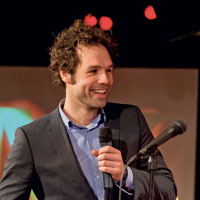
Thimon de Jong
WHETSTON / strategic foresight
Thimon de Jong runs WHETSTON / strategic foresight, a think tank specialised in future human behaviour & societal change and the implications for leadership & business strategy. He is a sought-after global (virtual) keynote presenter and leadership trainer. His clients include Morgan Stanley, Vodafone, IKEA and Nike.
Thimon also lectures at the social psychology department of Utrecht University where he teaches master students how academic research can be practically applied to improve business strategy. He has a master’s degree in Cultural Studies with a minor in International Business Studies.
He is a former insights & strategy director at TrendsActive, researcher at FreedomLab Future Studies and editor-in-chief of RELOAD Magazine.

Professor Catherine Mangan
Professor of Public Management and Leadership and Deputy Pro Vice Chancellor for Equality, Diversity and Inclusion at the University of Birmingham
Catherine is Professor of Public Management and Leadership and Deputy Pro Vice Chancellor for Equality, Diversity and Inclusion at the University of Birmingham. She joined academia in 2012 after a career in policy development, implementation, and consultancy. She is an experienced developer of executive education programmes that deliver genuine shifts in understanding and behaviours and has written about the need for new pedagogies to support effective executive education.
She joined academia in 2012 after a career in policy development, implementation, and consultancy. She is an experienced developer of executive education programmes that deliver genuine shifts in understanding and behaviours and has written about the need for new pedagogies to support effective executive education.
Catherine is an experienced research leader and regularly publishes academic publications and writes widely for policy and practice audiences. Catherine’s research focuses on the improving the development of leadership skills and practice in public service.
Her research into the public service workforce (published as the 21st Century Public Servant) focuses on the roles, skills and capabilities of professionals working in public services and has been extensively used in the local government sector. She also researches the future roles and skills of locally elected councillors; and in particular the role they play in shaping adult social care.
She is an experienced developer of executive education programmes that deliver genuine shifts in understanding and behaviours and has written about the need for new pedagogies to support effective executive education.

Dr Kris De Meyer
University College London
Kris is the Director of the Climate Action Unit (CAU) at University College London. He is a neuroscientist, science communicator and science-policy co-production expert.
Kris specialises in how people become entrenched in their beliefs, how this leads to polarisation in society, and how to overcome this.
At the CAU, Kris is responsible for the neuroscientific underpinning of the Unit’s interventions into complex problems.

Nick Richmond
Tricordant
Nick has a passion to design healthy, high performing organisations. He has worked as an organisational consultant across multiple sectors over the past 18 years. Nick is a Director and Practice lead for Organisation Design at Tricordant Ltd, a boutique organisation design and development consultancy. He has led the European Organisation Design Forum (EODF), including as Chair since 2012. Originally qualifying as a Chemical Engineer, he was awarded an MBA with distinction in 2006, he is Certified Organisation Design Professional, a MSP accredited practitioner, a trained Future Search member, a Certified Practitioner in Consulting and Change through The Tavistock Institute of Human Relations, and a Certified Lego® Serious Play® Facilitator. We is currently actively writing about AI enhanced organisation design.
He uses innovative tools including Lego® Serious Play® , PRISM a neuroscience-based behavioural assessment tool, and an operating model design AI called Reconfig® to help leaders and organisations thrive in complexity. His clients include: Boehringer Ingelheim, Bayer, BAE Systems, Babcock, BMW, Rolls Royce, NHS Wales, NHS England Commissioner and Provider organisations, Essex County Council, Staffordshire County Council, Cabinet Office, Government Office for Science, Companies House, Government Legal Department.

Dame Dr Neslyn Watson-Druée DBE
Beacon Organisational Development
Dame Dr Neslyn Watson-Druée DBE is one of Britain's foremost experts in leadership development and organisational transformation. As a sought-after keynote speaker, she shares practical insights drawn from decades of experience developing leaders across public and private sectors, including the National Health Service and British Government departments.
Dame Neslyn was honoured with the Dame Commander of the British Empire (DBE) in 2023 for her work developing women and minorities in leadership, adding to her Commander of the British Empire (CBE) and MBE honours.
As Managing Director of Beacon Organisational Development Ltd, she serves as a trusted advisor to senior executives and boards.
Her pioneering leadership methodologies have helped transform numerous organisations, including her notable work as Chairman of an NHS Trust where she led significant organisational change.
A business psychologist and certified high-performance coach, Dame Neslyn brings unique insights into emotional intelligence and creating lasting organisational change.
Her keynotes blend real-world experience with clear, practical approaches that inspire leaders to achieve meaningful impact while staying true to their values.
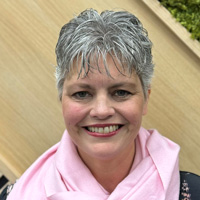
Ceri Witchard
Director, Academi Wales
Ceri became Director of Academi Wales in April 2024. Prior to this, she spent over 20 years in the public sector in Wales, leading operational and policy teams, and developing and delivering training programmes in a variety of contexts.
After initially joining the civil service as a specialist, a patent examiner within the Intellectual Property Office, she later moved on to work on copyright policy, business support and training.
From there she moved to Companies House, where she was a member of the Executive Board leave strategy and policy, and also being the Regulator of Community Interest Companies.
In 2018 she joined Welsh Government, leading on environmental policy, before taking on her current role at Academi Wales.
Applying for Summer School - the process
Submitting your application
We have a limited number of places on this programme, which will be awarded through a competitive selection process. It's important that you submit strong objectives and outcomes which align to both you and your organisation.
To ensure that the delegate group benefits from a relevant mix of experience we use several criteria to sift applications including motivation for applying and how applicants will apply the learning to benefit themselves, their organisation, and the wider public service, consideration is also given to sector and regional representation.
Places will be awarded to those applicants who provide strong objectives for participating in the Summer School and can evidence their return on investment.
Please answer the following questions in your application:
- Personal Objectives - Please succinctly describe your current leadership role and responsibilities (100 to 150 words)
- Departmental/Organisational Objectives - What are your learning objectives for Summer School? (100 to 150 words)
- Personal Outcome Statement - How will Summer School help address the challenges in your work? How will you apply the learning? (100 to 150 words)
Learning objectives
Learning objectives are statements that describe significant and essential learning that learners have achieved and can reliably demonstrate after Summer School. In other words, learning objectives identify what you will be able to do by the end of the programme.
Learning objectives should:
- Reflect essential knowledge, skills or behaviours
- Focus on results of the learning experience
- Reflect the desired outcome from the event, not the means or the process
- Be a minimum of 100 words and a maximum of 150 words
Example of what is appropriate in an application
As Head of Service, my focus is on creating collaboratively developed and effective public services. To achieve this, I aim to enhance stakeholder and team engagement through improved skills and insights into effective engagement techniques. This goal is integral to my personal development plan and will contribute to my performance evaluation.
Following Summer School, I will review my learning with my manager and seek support for implementing actions. I’m particularly interested in Emmanuel Gobillot's insights on employee engagement and well-being, given the challenges my team faces in meeting business objectives.
By the end of Summer School, I intend to create an action plan, utilising learned tools, good practices, and peer support to translate the week’s learning into action. In July, I’ll share my experiences and action plan with the Chief Executive to ensure alignment and impact.
Example of what is not appropriate in an application
I expect to improve my engagement skills at Summer School by taking part in various learning opportunities and listening to the speakers.
It is important for me to have these skills to enable me to do my job.
The Summer School programme looks really interesting and a number of the sessions should help me with my learning and development.
Personal example
Example of what is appropriate in a personal example
Attending Summer School will help me gain a clear understanding of my engagement skills, identifying both strengths and areas for improvement. This clarity will empower me to create a focused personal action plan based on the insights I acquire during the programme.
Over the following 12 months, this plan will guide my efforts to track and enhance these skills, enabling consistent progress. Furthermore, my development will be discussed and evaluated as part of my regular development review process with my manager. These discussions will help assess my achievements, refine my approach, and ensure alignment with both my professional and personal goals.
The combination of Summer School and my personalised action plan will be instrumental in achieving meaningful growth, supporting my journey towards improved engagement skills and broader career development.
Example of what is not appropriate in a personal example
I would like to attend Summer School so I can become a more engaged leader.
Organisational example
Example of what is appropriate in an organisational example
As a result of attending Summer School, I will be able to use a variety of tools and techniques to better engage others in the process of service development and delivery, encouraging stakeholders, communities and key individuals to feed into this and own the results. This is particularly relevant for my work with emergency teams in Mid Wales, considering how we can develop a more responsive, cohesive service relevant to the communities within the region.
In July, I will provide my team with a session to share the tools and techniques learnt at Summer School and build these into our team plans for taking forward our key business objectives.
Example of what is not appropriate in an organisational example
I want to get better at engaging others and Summer School will hopefully give me the skills to do this.
Please note
- There are limited places available for this event which will be offered through a competitive selection process and places will be awarded to those applicants who provide strong objectives for participating in the Summer School and can evidence their return on investment.
- Demonstrating return on investment has never been more important than in today’s climate. Return on investment is not simply about financial gain. It's the sustainable impact of the learning for both you and your organisation and how this links to services provided for the people of Wales. It is particularly relevant for those who are working through challenging times and seeking to make significant improvements to their organisational outcomes.
- Summer School places are limited as the demand for places each year exceeds our capacity.
Delegate fees
How much does it cost?
£600 + VAT. This includes:
- Access to the full Summer School learning programme.
- Accommodation (nights of Tuesday 1 to Thursday 3 July 2025). Please note this is basic student accommodation.
- Breakfast, lunch and evening meal during the event.
You must meet any personal incidental costs, such as travel to and from the event, newspapers, bar bill and so on.
Please note: if you accept a place at Summer School and then withdraw from the programme, your organisation may be required to pay the full cost.
Bursaries
We are offering a limited number of bursaries to cover 100% of the delegate cost of Summer School 2025. We encourage applications from underrepresented, minoritised, and disadvantaged groups.
To apply for a bursary
Please provide evidence that you meet the eligibility (50 to 100 words). Your response needs to align to the criteria below:
- You are part of an underrepresented, minoritised, or disadvantaged group within your organisation.
- The size of your organisation.
How do I pay? What information is required?
Billing for Welsh public service and third sector applicants
Academi Wales is part of Welsh Government. You must provide the following details in your application:
- Full name of organisation paying your delegate fee
- Name and address of billing contact
- Email address of billing contact
Supplier: Welsh Government
Supplier address: Welsh Government, Cathays Park, Cardiff CF10 3NQ
To confirm your place, you must provide us with a copy of your purchase order (PO). We will invoice your organisation for your delegate fee after Summer School.
Payment can also be made by business credit card via GOV.UK Pay.
If you need further details on the invoicing requirements please contact our finance team at AW.Business@gov.wales.
Billing for Welsh Government applicants
Academi Wales is part of Welsh Government. You must provide the following details in your application:
- Branch finance manager email address
To confirm your place, your branch finance manager must provide the following details to AW.Business@gov.wales:
- Profit centre / Cost centre
- WBS code
- Your 6-digit staff / payroll number
We will issue a journal transfer to collect your delegate fee after the event.
Please note: not providing the appropriate finance information could put your delegate place at risk.
If you need further details on the journal transfer requirements, please contact our finance team at AW.Business@gov.wales.
Prepare for Summer School
Timetable
Tuesday 1 July
- 9:30am to 11:30am: registration and accommodation allocation
- 12:00pm: lunch
- 1:00pm: programme begins
Friday 4 July
- 12:30pm: programme ends
Frequently asked questions
-
Yes, you will only get the full benefit of this opportunity by attending every day of the 4 days of Summer School.
-
We encourage delegates to see the course as residential. However, if you live locally you may prefer to commute to and from your home. Please let us know as soon as possible if you don't need accommodation.
-
There are no childcare or crèche facilities available at the University. Delegates are expected to make their own childcare arrangements.
-
Meals and refreshments are included within the programme (alcohol, bar or café purchases are not covered).
- Breakfast: between 7:00am and 8:30am
- Dinner: 7:00pm
-
We will gather this information as part of the application process. Please advise as directed if you have medical or specific dietary requirements. For dietary preferences, please note that the University serves a variety of food. There is also a supermarket within walking distance of the campus.
-
Please be aware that because of the location, mobile phone and internet signals may be patchy and could be affected by weather conditions.
Wi-Fi is available.
-
Smart casual.
-
We will be taking photographs and seeking feedback and quotes throughout the event and the materials produced may be shared on our website and social media or used for future Academi Wales event marketing and training purposes. You will have the opportunity to agree or disagree to be featured in these materials when you complete the application form.
-
Summer School is delivered in English. However, delegate information and materials are provided bilingually, and simultaneous translation will be available in the plenary room. If you would prefer to join a Welsh-speaking facilitation group, please state this in your application.
-
You must complete any pre-work set; this will be available on the delegate hub.
-
Successful delegates will be invited to enrol onto the Summer School delegate hub. This is a secure closed site and can be accessed anytime, anywhere and on any device. The hub will provide the opportunity to share important information leading up to the event, have discussions and network with your fellow delegates.
It is important that you log onto the hub to receive regular updates and key information about the programme. We recommend you click the 'Subscribe' button, and select the 'As they happen' option to ensure you get the latest information as it is shared.
You will require an up to date web browser such as Microsoft Edge or Google Chrome to access the hub.
Travel
Travelling to Lampeter (external link)
Trains - Transport for Wales (external link)
Bus Timetables (external link)
Car sharing
Once the delegate list is confirmed, with your approval we'll share contact details. You can then make your own car sharing arrangements for travel to and from the event.
Contacts
If you have any other questions, please email us.

